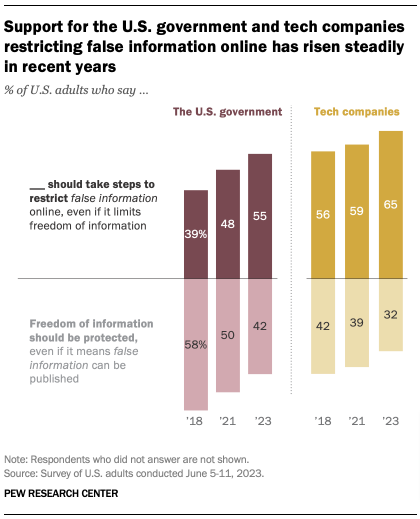The 168th Block: Digital authoritarianism
It's authoritarianism just the same
This week…
Your reading time is about 5 minutes. Let’s start.
The Good Vibes Festival in Malaysia was cancelled outright after 1975’s Matty Healy decided to kiss his male bandmate during a show because he is such as ally, isn’t he?
In reality, white saviours (the pale, stale, well, and male variety, especially) lose nothing of note and face no notable consequence for their performative activism, except probably never getting to set foot in a country they don’t actually care about in the first place. Who is left to bear the brunt? The queer community in Malaysia, the Malaysian music and arts scene, and diversity will face the consequences. It is not misdirected hate; it is pure ammo, it is a very good reason to double down on violence towards the queer community and the “liberal” music and arts scene. It makes life worse for marginalised communities that worked so hard to make life decent under so much hostility from a conservative society and authority. It‘s undoing a lot of that. Ugh.
And now, a selection of top stories on my radar, a few personal recommendations, and the chart of the week.
ICYMI: The Previous Block had more guidelines for AI in the newsroom, plus how text perplexity revealed AI discrimination against non-native English speakers. CORRECTION NOTICE: None notified.Singapore under the pandemic: The normalisation of digital authoritarianism
James Gomez for Engage Media:
These capacities were utilised against government critics and political activists, as revealed by reports and leaked documents. For example, in 2021, the government reportedly attempted to use spyware to hack into the Facebook accounts of two Singaporean journalists whose pieces are often critical of the government.
The use of surveillance tools, whether their use is legal or not, is enabled or facilitated through legal provisions and loopholes. At the government’s disposal are the Cybersecurity Act, Protection from Online Falsehoods and Manipulation Act, and the Infectious Disease Act. They contain vague and subjective definitions of key terms. To name one example, the High Court, in the case Chee Siok Chin and Others v Minister for Home Affairs and Another, laid out the context of “public order” in which rights may be restricted. The High Court’s interpretation, however, is built upon what is considered the ‘interest’ of public interest and not the maintenance of public order. This gives room for the government to implement intrusive measures against individuals even though such measures may not contribute to the maintenance of public order.
People who love Singapore are visitors with a great deal of Western privilege.
How Musk’s Twitter is jeopardising war crimes investigations
Raquel Vazquez Llorente for Tech Policy Press:
Since Elon Musk acquired Twitter in October 2022, the platform has undergone numerous policy changes. Once one of the most accessible platforms for external researchers seeking data to investigate human rights abuses, war crimes, and other international law violations, Twitter’s erratic policymaking under Musk may now hamper investigations into international crimes. Crucially, the new policy decisions may also have serious unintended consequences for communities often targeted by governments, such as activists, journalists, and human rights defenders reporting from crises and armed conflicts.
The ban on sharing live locations on Twitter is a privacy win for many, but it comes with consequences for human rights documentation.
Google’s AI chatbot is trained by humans who say they’re overworked, underpaid and frustrated
Davey Alba for Bloomberg:
Six current Google contract workers said that as the company entered a AI arms race with rival OpenAI over the past year, the size of their workload and complexity of their tasks increased. Without specific expertise, they were trusted to assess answers in subjects ranging from medication doses to state laws. Documents shared with Bloomberg show convoluted instructions that workers must apply to tasks with deadlines for auditing answers that can be as short as three minutes.
I know I have shared a similar story before in “The 165th Block,” but this piece also shows the contract staffers’ instructions for training Google’s generative AI.
What I read, listen, and watch…
I’m reading “The workers at the frontlines of the AI revolution” by Andrew Deck for Rest of World. It’s a long read, but it’s a good read.
I’m listening to “This Conspiracy Soup Contains Bugs – And Racism” on NPR’s Code Switch with Gene Demby and Huo Jingnan.
I’m watching two-time world champions Christen Press and Tobin Heath discuss the 2023 FIFA Women’s World Cup with their former coach (with whom they won those two times), Jill Ellis, on “The Re-Cap Show.” What a treat (on-brand American arrogance aside)!
Other curious links:
“I came to work in Ontario thirteen years ago. I don’t know when my family can join me” by Timothy Mark Bernard for Maclean’s.
“Woman’s iPhone photo of son rejected from Sydney competition after judges ruled it could be AI” by Tory Shepherd for The Guardian.
“Why AI detectors think the US Constitution was written by AI” by Benj Edwards for Ars Technica.
“Este chico es la voz de Spiderman, pero teme que la inteligencia artificial se la copie” por Carlos del Castillo en elDiario.es.
« TikTok rend-il la guerre sexy ? » par Daphé B. dans La Press.
Chart of the week
In the US, most favour restrictions on false information and violent content online. That’s according to a new survey conducted in June, with more than 5,000 respondents. Christopher St. Aubin and Jacob Liedke have the breakdown on Pew Research Center.





